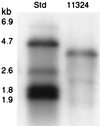Expression and functional properties of the Streptococcus intermedius surface protein antigen I/II
- PMID: 11402009
- PMCID: PMC98542
- DOI: 10.1128/IAI.69.7.4647-4653.2001
Expression and functional properties of the Streptococcus intermedius surface protein antigen I/II
Abstract
Streptococcus intermedius is associated with deep-seated purulent infections. In this study, we investigated expression and functional activities of antigen I/II in S. intermedius. The S. intermedius antigen I/II appeared to be cell surface associated, with a molecular mass of approximately 160 kDa. Northern blotting indicated that the S. intermedius NCTC 11324 antigen I/II gene was transcribed as a monocistronic message. Maximum expression was seen during the early exponential phase. Insertional inactivation of the antigen I/II gene resulted in reduced hydrophobicity during early exponential phase, whereas no effect was detected during mid- and late exponential phases. Binding to human fibronectin and laminin was reduced in the isogenic mutant, whereas binding to human collagen types I and IV and to rat collagen type I was not significant for either the wild type or the mutant. Compared to the wild type, the capacity of the isogenic mutant to induce interleukin 8 (IL-8) release by THP-1 monocytic cells was significantly reduced. The results indicate that the S. intermedius antigen I/II is involved in adhesion to human receptors and in IL-8 induction.
Figures








References
-
- Al-Okla S, Chatenay-Rivauday C, Klein J P, Wachsmann D. Involvement of α5β1 integrins in interleukin 8 production induced by oral viridans streptococcal protein I/IIf in cultured endothelial cells. Cell Microbiol. 1999;1:157–168. - PubMed
-
- Chatenay-Rivauday C, Yamodo I, Sciotti M A, Ogier J A, Klein J P. The A and the extended V N-terminal regions of streptococcal protein I/IIf mediate the production of tumour necrosis factor alpha in the monocyte cell line THP-1. Mol Microbiol. 1998;29:39–48. - PubMed
MeSH terms
Substances
LinkOut - more resources
Full Text Sources
Molecular Biology Databases

